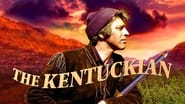weezeralfalfa
Burt Lancaster, as Kentucky frontiersman Elias Wakefield, has at least 3 particularly heart-pounding encounters in his quest to escape the traditional feuds between the Wakefields and Fromes by migrating to the Spanish-Mexican territory of Texas. In the first of these encounters, Burt has to fight off half a dozen towns people, who eventually subdue him and lock him in a makeshift jail until deciding what to do with him....In the second, Burt has to fight, without any weapons or protection , the bull-whip-wielding town tavern keeper and bully Stan Bodine, played by Walter Matthau, in his initial Hollywood role: quite a scene!....In the third encounter, Burt again finds himself defenseless on one side of a river against 2 rifle-toting Fromes on the opposite bank. He gets some essential help from bondswoman Hannah, in back of the Fromes, who takes aim with the rifle of her freshly-killed master: Bodine. With only one Frome to deal with now, he takes his chance, dashing across the very shallow river before his nemesis can reload.Lancaster has dealings with 2 women in particular. Hannah, who begins her association with Burt and his half-grown son as a bondswoman, who takes pity on them when the towns people turn hostile toward them. In return, Burt uses his money for steamboat passage to Texas to buy out her bondswoman contract. Hannah decides to leave this town with the Wakefields when they break out of jail. They head for another village where lives brother Zack, who's making a living as a tobacco grower and trader. Zack welcomes the 3, giving Burt odd jobs toward regaining his funds for the Texas trip. Early on, Burt thinks he may have found his fortune in a sizable pearl found in a mussel. The locals encourage him to inquire whether President Monroe might be interested in such, knowing it's worthless commercially. Eventually, Hannah sells herself as a bondswoman to tavern-keeper Bodine, to provide money for the Wakefield's journey onward. Meanwhile, Burt has taken a fancy to the village schoolteacher, Susie, and she to him. Brother Zack encourages him to forget his Texas dream and settle down in that village with Susie, who has no desire to go to Texas. Burt swallows this bait for a while, but the captain of the Texas steamer tries to convince him that he's a natural frontiersman, not psychologically suited to planting his feet in a settled village. Besides, he's not yet out of the range of the two murderous Fromes, who eventually show up, as I previously detailed. This, coupled with Hannah's heroics against the Fromes, and the death of her master, causes Burt to rethink his life plans.This little-known "western" certainly rates a look, with many details I didn't mention. It's currently available at YouTube.
Robert J. Maxwell
It's 1820 in Kentucky. James Monroe is president, and Burt Lancaster is a freedom-loving woodsman who takes his son, MacDonald, and heads for the river town where they will say hello to Lancaster's big brother, McIntire and his wife, Una Merkel. Along the way they pick up a young lady, Foster, and meet a friendly school teacher, Lynn.Well, while they's a-waiting' for the river steamer, ol' Burt soon has two wimmen a-moonin' after him -- one a indentured servant gal and the other a purty school ma'rm a-looking for a husband to go with her house. I shore hope I spelled "indentured" wright. Don't know what it means though. Maybe it means she got all her teeth. Sounds good for ol' Burt but it ain't so hot. I oncet had FIVE gals a-moonin' after ME and they was all purty too. Well, we done heard the chimes at midnight more'n oncet, and one night when we was pie-eyed there was all SIX of us, a-baying at the moon like Burt's huntin' dog, Pharaoh. The voices tell me to do things like this.The problem is that Burt has spent all their "Texas money" to free Foster from bondage. Now he has to go to work for his brother McIntire, and his boy has to go to school and learn something. "I'll turn him into a businessman," says well-meaning McIntire, "and I'll wear that buckskin right off him and OUT of him." This is not Burt's idea of a good time. He likes to lie out in the woods with his boy on a "prime night" and chase a fox or two with Pharaoh. ("The unspeakable in pursuit of the inedible.") The two of them yearn for the open skies of Texas where the air "tastes like it's never been breathed before." Aside from not having any money, there's another problem or two that need facing. Kentucky is a country of feuding clans and one scabrous clan is on Burt's tail. Another is the local mean guy who runs a saloon and wields a great big whip -- Walter Matthau, if you can believe it. On top of that, McIntire's wife begins to scold them for their backwood ways. She kicks the dog off the couch and nags Burt and his boy, which is beginning to sound painfully like my marriage.Two outstanding scenes for a warm and ordinary family movie: Burt and son playing rich hicks for riverboat gamblers and then turning the roulette wheel on them; a really NASTY fight between the sadistic and dirty-fighting Matthau and the proud and indefatigable Burt. Burt is whipped to tatters but guess who is knocked out.Very nice photography by Ernest Lazslo and a subtle score without a whistleable tune in it from Bernard Herrmann. Burt's direction is functional without being distinctive. It's not a bad movie. It's a warm, family drama with a little romance and violence to spice it up.
Rich Wright
Not a fried chicken in sight in this film, and Burt Lancaster and son attempt to get to Texas in the early 19th century. They're hunters by trade, and love a good sing along too... so earplugs at the ready. Both are mercilessly picked on by nasty townsfolk as they attempt to raise enough money for the trip, and soon Lancaster finds himself in a love triangle with two women. Is he going to pick the one who seek to domesticate him away from his wild'n'free lifestyle, or will he opt for the gal who seeks the rolling plains of the lone star state? The answer may surprise you... (No it won't).Lancaster and his kid are so moral and upstanding compared to the other residents of this sleepy nook they find themselves in temporarily, it's easy to root for them as they beat the bullies while aspiring to their promising future. There's some fistfights, a bit of shooting and lots and lots of fake looking facial hair in this commendable sort-of Western, which is perfect for a Sunday afternoon in. Sergio Leone it ain't, but it does what it sets out to do... And has the added bonus of not ending a moment too soon. 6/10
MartinHafer
I think one of the worst problems with American films from the 1930s-1950s is that way too many Westerns were made. Part of the problem that plot-wise, most are very, very derivative--with the same basic plot being rehashed yet again (if I see one more Western about rich guy who runs the town and is trying to force all the farmers/ranchers/sheep herders to sell out to him, I'm gonna puke). Because of this, I love films that talk about American history that are unusual--not Westerns or war films--just something different. This film is about life 'out west' (in the Tennessee area) circa 1820--a period WAAAY underrepresented in American films...heck, it's hardly ever even mentioned! So, from the onset, I was pretty happy about the setting of this film.Burt Lancaster plays an outdoorsman--sort of a Davy Crockett or Daniel Boone sort of fellow. The main difference is that he also has a young son AND doesn't want to abandon him (Crockett and Boone should have taken note NOT to do this). The problem, however, is money. He and his son love the carefree outdoor life--but it takes money to get to this promised land. In the meantime, the two are forced to hang around civilization (at least what approximated it out on the frontier). Here in town, Lancaster's brother (played by John McIntyre--a guy who looked nothing like Burt and seemed too old for the part) pushed for him to go into business with him--and get rid of his buckskin clothes and settle down. In addition, two women wanted him--the school teacher (who represented domesticity) and the indentured servant (who believed in his dream). What will happen? Will Burt and son become domesticated and civilized or will they eventually make it to the wide open lands of Texas? Overall, this is not one of Burt Lancaster's best acting performances. He's good--but also pretty unremarkable. But, the film is different and reasonably well made--and it's hard to dismiss it. A nice film, at least from a history teacher's perspective, and well worth seeing.




